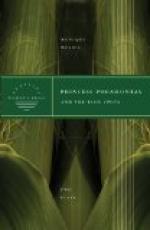Pocahontas did not overhear this talk, but she had watched the four strangers together and her sharp ears had frequently caught the word “Smith” repeated. Now when the news was shouted through the lodges that the boat bearing Smith and his companions was approaching slowly through the broken ice, Pocahontas hurried eagerly to the river and waved her hand to her friends. She watched them come ashore but checked herself as she started to run to meet them. She had a feeling that this was not the moment for pretty speeches, and feared that Powhatan’s enmity to the English had been fanned by the Dutchmen until it was ready to burst forth. She determined, instead of showing any interest in the strangers, to appear indifferent to them and to let her people think she had grown hostile to them. She would stay close to her father in order to learn what he intended to do.
The werowance as he came towards them did not wear his red mantle nor his crown of English make, but a headdress of eagle feathers and leggings and a cape of brown bear fur. Perhaps he wished to show that he had no need to wear a crown to look a king. He strode slowly to the river and called out in greeting to the white men:
“Ye are welcome to Werowocomoco, my son, but why comest thou thus with guns when thou visiteth thy father?”
“We be come to buy food from thee, oh Powhatan,” answered Smith, “to fill thy hands and those of thy people with precious beads and knives and cloths of many colors for thy squaws in exchange for food for to-day and to last till comes nepinough (the earing of the corn), when we shall harvest the fruit of the seed we plant.”
“But lay aside first your arms. What need have ye of arms who come upon such a peaceful purpose? Have ye thought to try to frighten my people to sell thee of their stores? What will it avail you to take by force what you may quickly have by love, or destroy them that provide you food? Every year our friendly trade will furnish you with corn, and now also, if you will come in friendly manner to see us, and not thus with your guns and swords as to invade your foes.”
Many of the English, when Smith had translated word after word of the chief’s discourse, felt shamed at the show of force their weapons manifested, and would have been willing to lay them by while they were upon the land of this friendly chieftain, whom, they felt, they had misjudged. But Smith was not deceived. He was learning to read the signs of Indian ways, and he knew that the chief had reasons for desiring to see them unarmed. So he called out in answer:
“Your people coming to Jamestown are entertained with their bows and arrows without any exceptions, we esteeming it proper with you as it is with us, to wear our arms as part of our apparel.”




